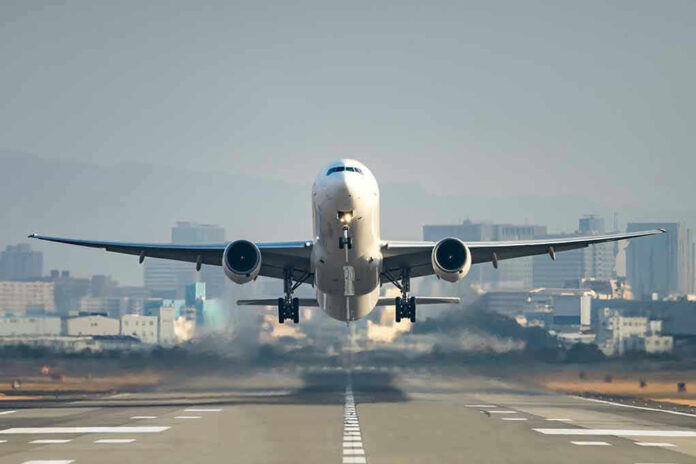One passenger’s midair claim—“My laptop is a bomb”—threw 177 travelers and six crew into five hours of chaos, but the fallout reveals far more about today’s upside-down priorities than just another false alarm at 30,000 feet.
At a Glance
- Bomb threat on Allegiant Air Flight 1023 forces emergency landing and federal charges against suspect Taj Malik Taylor
- No actual explosives found; incident stems from suspect’s recent psychiatric release and “mental confusion”
- All passengers and crew delayed for five hours, highlighting security and mental health failures
- Case underlines the urgent need for common-sense screening and security, not more bureaucracy or woke posturing
America’s Skies: Unsafe, Unsettled, and Unapologetically Absurd
It’s getting old: another day, another airborne nightmare. Allegiant Air Flight 1023 took off from Florida, heading for Roanoke, Virginia, July 6, 2025. Less than an hour in, a man named Taj Malik Taylor, 27, recently sprung from a psychiatric facility, announces to his seatmate that his laptop is a bomb. Not once—multiple times. The seatmate does what any sane American would do and alerts the crew. Instantly, the aircraft veers back to St. Pete-Clearwater International, leaving 177 passengers and six crew with their day ruined. Yes, it’s another “no bomb, but sorry for the trauma” episode, complete with K-9 sweeps and the FBI.
Let’s recap: Taylor, former high school football player, Air Force veteran (his claim), and current seminary student, is fresh out of psychiatric care. No medication clarity. He’s on a commercial jet with a computer and a story that’d make the TSA’s hair stand on end. The flight turns around, lands, and the bomb squad does their thing. No explosives—just another day in the friendly skies, right? The “bomb” is nothing but a personal computer in the hands of a troubled man. Law enforcement hauls him off, and the rest of the flight is delayed five hours while everyone’s nerves get a thorough fraying.
The Real Threat: Policy Paralysis and Security Theater
Here’s what infuriates any honest working American: bomb threats are now so routine we almost expect them, but our system seems more equipped to apologize than act. Why was Taylor, with a recent psychiatric history, allowed to board a plane unsupervised? How is it possible, with all the “advanced screening” and security bureaucracy—funded by your tax dollars—nobody caught the red flags? Is mental health so stigmatized or so untouchable that common sense is now subordinate to “inclusion” above all else?
The FBI, Pinellas County Sheriff’s Office, and U.S. Marshals did their jobs after the fact, but what about before? Airlines and federal agencies, under pressure to be ever more “compassionate” and “non-discriminatory,” are now in a bind. If they act on obvious warning signs, they risk lawsuits or public outrage from the “rights” crowd. If they don’t, 177 Americans get five hours stolen and a plane full of families is traumatized. Either way, the ordinary traveler loses, and the system shrugs off accountability. Meanwhile, the expert class will host another roundtable on “balancing compassion and security,” as if that’s a replacement for enforcing basic sanity in public safety policy.
Who Pays? You Do—In Time, Dollars, and Sanity
The consequences are broad and expensive. Emergency landings cost airlines and taxpayers a fortune, and every false alarm ratchets up anxiety for travelers who just want to get home. Taylor faces up to five years in prison and a $25,000 fine for making a false bomb threat, but the legal system will now spend months (and millions) on hearings, evaluations, and expert testimony. As for the passengers—kids, parents, workers—they’re just collateral damage.
Airlines and law enforcement will be pressured, once again, to “review their protocols” and “consider reforms.” We all know what that means: more paperwork, more training seminars, and more federal funds funneled into programs that never seem to stop the next incident. The only thing that never gets “reviewed” is the culture of excuse-making and the refusal to prioritize public safety over political optics. When did protecting the feelings of the unstable become more important than the rights of 177 law-abiding citizens to travel in peace?
Common Sense Lost at 30,000 Feet
This incident is not just about one disturbed man and one disrupted flight. It’s a microcosm of what happens when our institutions value appearance over action. The result: more risk, more expense, and more exasperated Americans. Passengers were finally allowed to resume their trip after five hours—no apology, no compensation, just another day lost to a system that bends over backwards for the few and lets the many suffer the consequences.
Maybe one day, sanity will return to public policy. Until then, every parent, grandparent, and hard-working American who boards a plane has to wonder: will today’s flight be another lesson in what happens when common sense is grounded by politics?











